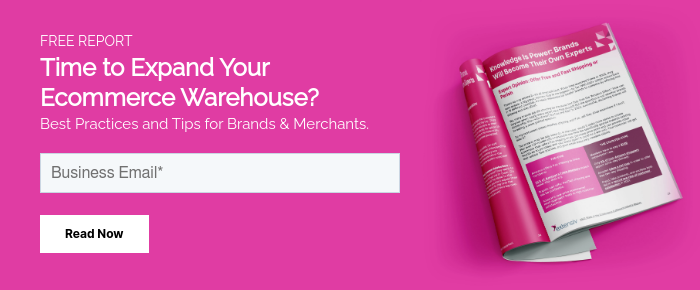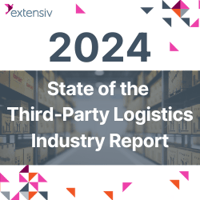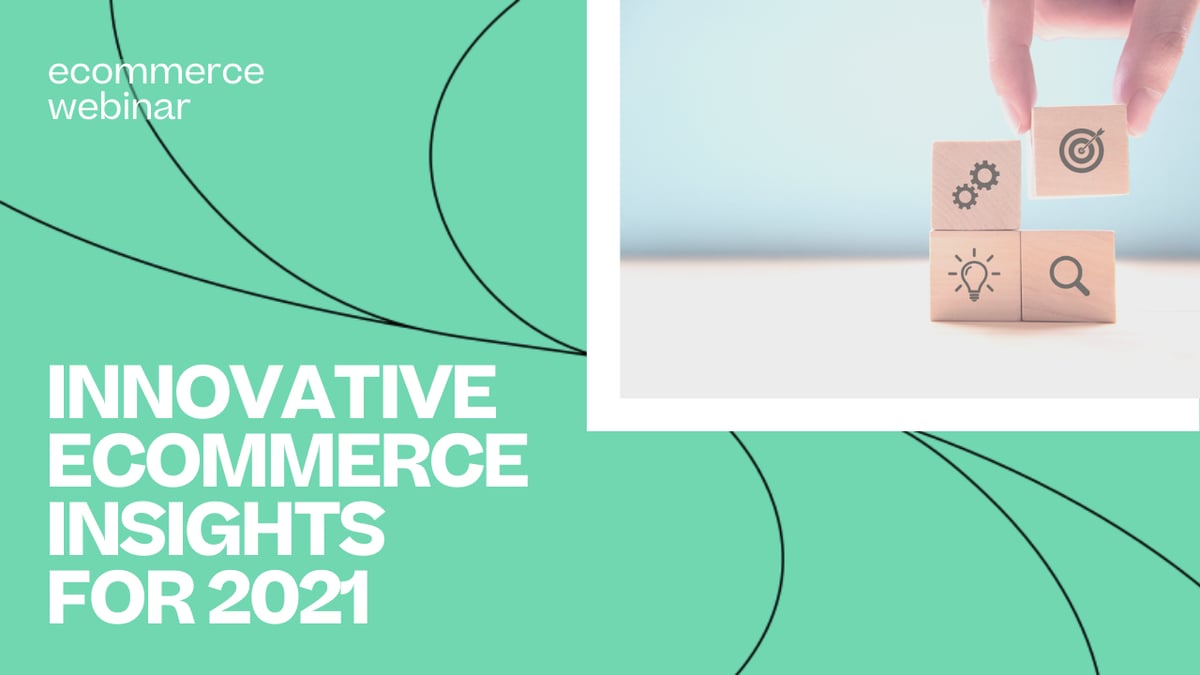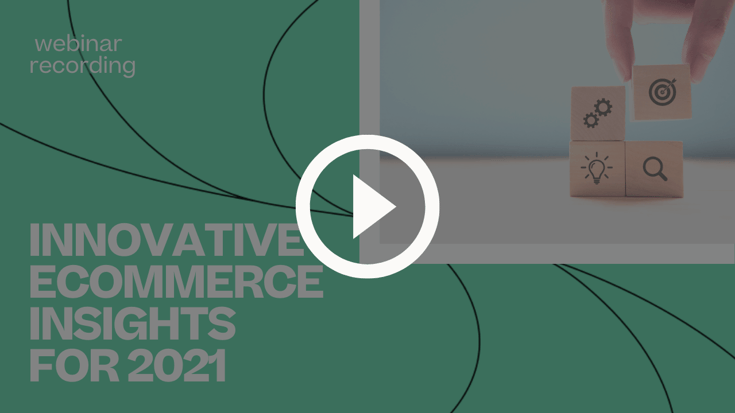Identify the trends in your performance across sales channels to unlock the next areas of growth on Shopify, Amazon, Walmart, and more!
Watch the replay right here or read the transcript below:
Transcript
Jeremy Horowitz:
Welcome everyone to another episode of the Innovative Insight series today. I am so excited to talk about really getting more out of your operations and using intelligent data to drive your business forward. So, without further ado, let's dive right in, and I'm gonna introduce our guests today. So first Will, do you wanna give us a quick background on yourself and what you're working on over at Marketplace Valet?
Will Land:
Yeah, absolutely. So my name is Will Land, and I'm a co-founder here at Marketplace Valet. Marketplace valet is a full service Amazon and Marketplace agency, you know, anywhere from logistics to content creation, ad management . I've been selling on marketplaces since 2001 and it's been a fun and exciting ride ever since.
Jeremy Horowitz:
Yeah. I can only imagine, especially past 18 months.
Jeremy Horowitz:
So Chad So Chad, for anyone who isn't familiar with Extensiv or yourself do you mind giving me a quick background?
Chad Rubin:
Yeah, absolutely. A first-generation merchants selling on Amazon similar to Will. I've been doing this for a really long time and out of my pain of running my own D to C brand called Think Crucial. We started Extensiv out of that pain and started selling to other brands and merchants that had similar profile of pain that we did. Also very involved, I wrote a book, Cheaper, Easier, Direct which is centered largely around winning a D to C along with the prosper show, which I was on the board of and we sold not so long ago to the internet retailer conference. So I've been in this for a long time and so what Extensiv is, and Will knows best because he's a mutual customer of both of ours Udacity and Skubana, we essentially are a inventory management platform that has order management capabilities with profit diagnostics, all built into one platform. Very similar to us, kind of like what Shopify did to Magento. We're really focused on doing that to NetSuite and making operations much easier. It doesn't have to be painful and hard.
Jeremy Horowitz:
Perfect. I think that's a great segway also into what we're going to talk today about leveraging the data that's captured through all those marketplaces and all those channels to make operations easier and to scale up the business. So Will, do you want to give us a quick just overview on the challenges that you all were facing and kind of what led you to start building out this, we'll call it marketplace analytics suite.
Will Land:
Sure, absolutely. Yeah. Internally we call it a 3P, 360 and so basically we had a need. We, you know, we, we manage quite a few clients in, in and their fulfillment and Amazon and and all the marketplaces and what really we needed is a way to show clients their data through a portal individually so that they can come in, see their business holistically. So, you know, you know, you can log into amazon and say how did Amazon do today or log into eBay and see look at my sales and look down at your Shopify, but we wanted to bring that all together in one dashboard and that's what we've done this year. Through 3P, 360 it's just a full service PIM inventory and sales tool that, yeah, that, that kind of gives you that holistic view of what you're, what you're doing. And, you know, it was, it was made by, created by Udacity and with, you know, obviously with the help of Skubana's owned API, you know, we're, that's that's kind of our big rollout for 2021.
Jeremy Horowitz:
Very cool.
Will Land:
Yeah.
Jeremy Horowitz:
Two quick follow-up questions for anyone who isn't familiar with a PIM, what does that stand for?
Will Land:
So it's a product information management tool. So think of when you, you know you own a brand and you need your images you need your titles, you need any documentation you need your DIMs, what's your cost? It's a place where all this information is stored in one database that you can go and access and download quickly, you know integrate to an API to spread that data out for, you know for other marketplaces.
Jeremy Horowitz:
Awesome and then second question is I know you mentioned Amazon. Are there any other marketplaces that you all were tracking through this, the 3P system?
Will Land:
Yeah, absolutely. So definitely, you know, our clients enjoy, you know, eBay, Walmart and then we are connected to about 16 or 17 other Amazon sites internationally.
Jeremy Horowitz:
Very cool. So, Chad, just to quickly dive into the tech side. So I know that you all are working with a lot of marketplaces and then you also have your own marketplace which is kind of how we built that original integration. So can you just walk through like how at a high level that all works, how you all are capturing and storing that data, so that awesome deep dives into all that marketplace data can be visualized exactly like
Chad Rubin:
Yeah, on a high level, we're sort of ripping out a page of the Shopify playbook, which is really, we want people to build, to add strength to our platform and we can't be everything to everybody. So the way to do that is to have an app ecosystem which Udacity is involved with, where they build into our API and allow us to extend and add strength to our platform with the click of a button and so that's why, you know when we first went to the Shopify unite conference and they launched their app ecosystem, we were like, okay this is something we need to focus on. We have a very small team. We want to shape what our mama gave us. We wanted to be the best we can possibly be at operations, but we know, that like, to go super deep into, into the kind of data that Will really needed for his clients and his business there needed to be more, more to support that and that's really, that's really when it comes down to and a lot of merchants and brands very similar to Marketplace Valet they're, Why did, we, I would say in general, right. Merchants and brands, going direct to consumer is not enough anymore, right? We've had to sort of move away from being sellers on Amazon, for example, which is where I got my start, and I think Will did too, into becoming advertisers and becoming a lot more smart about the way we deploy our dollars. So we get a nice return on investment because, Amazon's really good at telling you what you make, but they're really bad at telling you what you keep and so we've had to become a lot smarter about it and this is one great way that we've been able to do it.
Jeremy Horowitz:
Yeah, definitely. So Will just going right on that thought. What are you all really diving into? What is the important information that you're pulling out of all of those marketplaces that really is having a meaningful impact on the business?
Will Land:
Sure. So I think, you know one of the most relevant things, you know at least with Amazon is when we look at virtual bundles, you know, with, with getting a lot of this data out, we're able to see what the cross sellers, the best selling cross sellers are and believe me, when I say that it's not the things that you'd normally think that you know, pair well together, you know, when when we get the data that, that shows that someone bought a bracelet and they bought a necklace, you know, that that's that's kind of invaluable data to say, okay we should be selling this together as a as a kit or a bundle, you know, kits and bundles are kind of what helps us take up more Amazon real estate space and, and creating, you know, virtual bundles such as these things with proven data is, is, is really invaluable.
Jeremy Horowitz:
Definitely. So is there anything on that and we're talking about row ads and advertising and profitability and the bundles, I think attack that really well. Is there anything else in the advertising side that you all are seeing to be really insightful?
Will Land:
Yeah, I, I can, what we're definitely seeing through a lot of datas, as well as, is a lot of repeat buyers, not, you know not only you'll get them definitely on your Shopify, but but in particular on Amazon the repeat buyers that come in and purchase, you know same or like items over and over again, I think that generally gets really overlooked when we're talking you know, average cost of sale or cost of sale and I think that really needs to be factored in to when you're looking at your customer acquisition and there's costs thinking about that lifetime value of the customer, particularly on Amazon. I think that gets overlooked.
Jeremy Horowitz:
Yeah.
Chad Rubin:
Sorry, wait, are you baking in the LTV as part of your A costs when you're doing the analysis if you're how much you're going to spend.
Will Land:
Yes, exactly. That's exactly right. Exactly. Yeah. Once, once we have that data we can go back and obviously adjust those A costs for the lifetime value.
Jeremy Horowitz:
Very cool. So for anyone who isn't familiar with, I mean I think everyone will be familiar with LTV, for more of A cost. Do you mind just quickly breaking down what that is and how it differs from ROAS?
Will Land:
Yeah, sure. So I mean, A costs and ROAS are virtually the same thing. It's just data broken out in two different ways. A costs is for, stands for average cost of sale. And that's basically, you know, if I put $20 into or if I put a hundred dollars into ads, you know, I, I you know, my A cost is a percentage of what I've spent. So again, let's, sorry, let me rephrase that. If I put $20 into ads and I get a hundred dollars in sales that's a 20% average cost of sale. ROAS is factored a little bit differently, where as it's kind of, you know, what are my earnings on spend? So again, taking that, that same model, if you have a, if you spend $20 on Amazon and get a hundred dollars in sales, that's a five, it's five ROAS, and gosh, I'm losing what the ROAS acronym is
Jeremy Horowitz:
Return on ad spend.
Will Land:
Return on ad spend, there you go. There you go.
Jeremy Horowitz:
Yeah. So also I think it's a really interesting way of looking at it because, it's also, going back to that same concept of what you actually keep off of platform sales. So Chad, I'm going to throw it to you. How do you typically see other brands working with all the marketplace data to get to this really granular analysis of how do we, can really make the most of both A cost and LTV to build a healthy long-term sustainable business?
Chad Rubin:
So, okay. So there's, there's a lot to that. I would say one. So Skubana, like I said, we're an operations platform. We do a profitability diag, diagnostics, and then Udacity just takes it to a whole nother level, right? If you want to, like double click in to it and go super deep, that's where Udactiy comes in, speaking specifically around Extensiv and I do want to get to the Udacity value prop as well, in Skubana, since we, are order management and inventory combined into one platform, right? Where we can do FBA orders, you can print shipping labels you can get to your 3PL, Extensiv takes the shipping costs and the commission fees and all of that and base it in, so you can see your skew profitability, which to me is like the Holy grail of where E-commerce merchants and brands, what they want to see, and that's your profitability, essentially, we'll say, Hey here for a date range, here's my total profit of the company and then we'll break it down on a skew level and then you can break it down on a channel level and then break it down and peel that onion back again and see the orders that are contributing as a contribution margin to your overall profit and that's a huge paradigm shift from when you look at something like QuickBooks or NetSuite, because QuickBooks or NetSuite, they say, here's your revenue, here's your expenses, here's your profit and you're like, well, what, how did you get to that profits? It's really hard to actually drill down and double click in that software because it's not purpose-built for commerce. They didn't, when they were when they built those softwares there was no sense of a marketplace or of Shopify and so that's really where the benefit to me and where Extensiv comes in and so you take all that channel data and now funnel it into Udacity, which is purpose built for analytics and hope, it opens up lifetime value repeat customer information, your, the LTV information to inform A costs. So you can actually run your business much more smarter and have a competitive advantage which most, majority of sellers don't have.
Jeremy Horowitz:
Yeah. There's so many things that I love in there. Especially contribution margin on a skew basis. I know it's a big thing that you talk about a lot. And I think, I agree. It's something that more brands need to focus on because you can if you don't know what your contribution is you're really great at moving product. You might not be really great at making a lot of money and I think there's an interesting distinction there.
Chad Rubin:
And, and to just piggyback on that for a second when, let's just say a Marketplace Valet or my own business is looking to sunset a product. You may not want to sunset the entire product across every channel, right? You may want to sunset it because Walmart gives you more profit or selling on the dirt, on the target marketplace is far more profitable or Home Depot, than Amazon is, or vice versa. So you can start picking and choosing where you want to double down on those winners and where you want to sunset those losers that are on specific channels that you sell on.
Jeremy Horowitz:
Yeah and understanding that distinction is really well. So, Will, I want to throw it back to you. What are some of the best practices that you all have seen or tips that you would recommend based on running this now for all of the brands in your portfolio?
Will Land:
So I guess again, you know, the cross selling aspect we talked about that, you know, the, looking at your lifetime value of the customers. We looked at that. Sorry, repeat that Jeremy one more time.
Jeremy Horowitz:
Yeah. So where else do you just see like real opportunities for growth or maybe some tips right now?
Will Land:
Oh, right.
Jeremy Horowitz:
other brands.
Will Land:
Yeah. So, you know, one thing that we're really honing in on in 2021 is, marketplace expansion. You know, I think I mentioned earlier, we're on 17 Amazon sites international and, you know, that's kind of where we're making some, some big moves is, you know, okay, we've conquered Amazon. That's great. Now, how do we replicate that on multiple, multiple marketplaces? You know, I'm always been a big believer in diversification of revenue and, and, you know, by doing, expanding to the middle East and South America and to, you know the Wayfairs and, and the targets, you know, keep, keep keep the brand building in all directions because, it you know, Amazon's going to be around for a while, but there's going to be a lot of compliments to it along the way and I always say, you know maybe at the end of the, at the end of the day sales don't look great for a particular marketplace, but you look at it at the end of the year on your P and L and it, and it stacks up really quickly. So I'm in for a marketplace expansion big time.
Jeremy Horowitz:
Nice. I like the, conquer the world mentality behind that, something's working let's get it into as many markets as possible. So Chad, where do you think some other opportunities are to either unlock more data or just unearth some of those more important insights that you all are finding across the platform that you think more brands should really rally to?
Chad Rubin:
Sorry. I was on mute, rookie, rookie mistake on zoom. So Extensiv was started as a direct consumer platform and that's sort of why we've been such a beneficiary as there's been a shift of spend from offline retail to online retail, but I don't think offline retail is dead, in any way and there's a lot of channels for acquisition that aren't being leveraged right now just given the state of the world and I think when things do open back up, so it's not just, I do think marketplace is, marketplace expansion skew expansion is very important, but I think having a platform like Skubana, that allows you to go direct to everywhere, which is actually a trademark word that we use, going direct to everywhere versus just direct consumer is going to be still the way forward, no matter, you know, post pandemic world what it looks like and so whether it's a pop-up shop, whether it's doing joint collaborations with adjacent brands that have very adjacent demographics that you target as a company I think that's going to be really interesting in 2021 along with marketplace expansion, along with finding adjacent products that you want to add to your portfolio and using that information that, that they are pulling from Udacity, for example which is the virtual bundles, right? Figuring out if a company, if a person sells hand sanitizer buys hand sanitizer, and they're buying this at the same time I'm not saying that this is a, a great example but pairing it together and using that information to inform your digital shelf assortment.
Jeremy Horowitz:
Yeah, definitely. More effectively you can turn the inventory. The more you sell, the more you sell, the more you can conquer the world. So where I'd love to is kind of pivot it to the other side of the conversation now. So it sounds like we were talking about a lot of the great opportunities. Will, I'm gonna put you on the hot seat first. What would you say is a lesson learned or maybe something that didn't really pan out when you all started this project that if someone was going to follow in your footsteps you would recommend like, hey, walk down this path instead?
Will Land:
Yeah. This is, this is kind of a fun topic because you know, I think, you know when we talk big picture, I think, you know keep in mind that a lot of that pictures outside the frame and people, people are looking at the frame. So, you know, when, when you're going to build something no matter what it is keep open-ended, keep it open-ended on all sides because you never know what's going to present itself whether it's development and software whether it's strategy, whether it's integrations, you know your big picture is, is unforeseeable. and just making sure you have a lot of open ends on, on you know, whatever, whatever project you're working on.
Jeremy Horowitz:
Yeah. There's always the stuff that you don't know. You don't know. So having that mindset is always great. Chad, anything on your side, any you would recommend as kind of some heartfelt lessons that other merchants have won or avoid, things that people could avoid?
Chad Rubin:
You know, this is a, a really important question for me. I've been working on a presentation, which is like my seven failures that made me a better brand merchant and so if you think about the world before COVID, I always considered, I didn't even know what to do with my E-commerce business because I was so focused on Extensiv and our numbers were just going down and to the right and so I've done a lot of reflection on how we could have changed 2019 and 2020 was actually our best year we've ever had in the company history and part of that was, hey, I think, very important being data oriented and I think we got away from that. Like, We were so focused on growing top line revenue, right? And we were like, you know what? We own the space. We own the replacement accessory space. Let's just go all in on A costs and we thought that everyone would just drop out because we were going to increase the spend so much and they didn't naturally drop out. They just increased spending, they, it became sort of like a pissing contest almost and so, so we started really getting focused on a very granular level from A crop, from an A cost perspective. That's just like one small example that we did. Another really interesting example that we had did, we did in 2020, which we benefited from was it was with COVID and with personal protection equipment we started selling vacuum bags and I didn't know why they were flying off the shelf and these HEPA bags could be used and repurpose as masks. So what did I do? I made a donation in Rockland County which is where I live, part of the time in New York, to the hospital. It got national press and a company called Hedley and Bennett reached out to me to actually start combining forces and they were selling masks. They re-pivoted their, their factory to make masks. We re-pivoted to supply them filter personal protection equipment with our vacuum bags that we actually individually cut here in the United States and it reopened an entirely new opportunity that never existed before. So we just got smart and it all happened while I was in the shower
Chad Rubin:
and that's where it all great stuff begins and so if you're struggling right now like every moment is a chance to turn it all around and that's what happened for us in 2020.
Jeremy Horowitz:
Very cool. So it sounds like the piece of advice there is take more showers.
Will Land:
Which I feel like a lot of people are not doing in 2020
Chad Rubin:
But it's a, it's a combination of taking more showers being more, much more data-driven than your competition. Like getting scientific about it to the penny. That's big, right. Being innovative and using data that you can get at your fingertips. Amazon is a database of information of reviews of what people bought frequently bought together. People aren't using this data and informing their business decisions and there's ways that you can be using this and getting creative to actually, actually like optimize your revenue and profitability that I think is untapped.
Jeremy Horowitz:
Definitely. I mean, I'll always agree. There's always more to do with your data. So kind of in wrapping up the last question and what we want to leave everybody with is, final nugget of wisdom, final piece of info that you want to impart. So Chad, I'll throw it back to you this time put you on the hot seat first. What's that kind of one final thing that you want to leave everybody with?
Chad Rubin:
I feel like I shared it already, which is I think is doing what your competition isn't doing and a lot of that comes down to data. I think part of it also is automation which we didn't really talk about much right now but I've been a huge fan of right? I run a very large E-commerce business. I have one employee running it and largely we let technology do what human, human employees can't do which is automating purchase orders based on warehouses and based on velocity across the channels and so if you're having, trying to have a root, new renewed focus and it's beyond just not accepting mediocrity in 2021 it should be focused on data and should be focused on how the heck you can automate and replace yourself so you can work on higher impact activities.
Jeremy Horowitz:
Cool. Sounds like we got to grab some more time to talk about automation. Which, Will, I'm sure you all are doing a lot of too so Will, [Jeremy] impart wisdom to bring us home.
Will Land:
Yeah, shoot, I, I'd love to piggyback on what, what Chad was saying. I mean, automation, removing manual processes. I mean, that stuff just bears you down, you know, it, anything that, that, you know, that is being worked on by a human unfortunately can be automated and and making that push to that, you know, on a human level we're able to make those, spend those times, you know making those, those more key decisions and, and really judging, you know, based off of of what, what humans do. Right? So that, and, and kind of going on, on the on the left here, what does, you know, everyone's been so focused on, you know, what's happening during COVID and and how do we, you know, use the market to our benefit and, you know, I, I think keeping in mind that, you know this will, you know, end in some way, you know the next nine, 14 months, and what does that look like? You know, I think there's going to be a lot of online real retail fatigue. People are going to want to get out and see people experience the shopping again. And, and it, it, it's, it's just one of those things that that everyone should be very conscious of and how do we build our business and maintain it around, you know, post COVID times, so.
Jeremy Horowitz:
Definitely, think it there's a lot of, sounds like a lot of planning and being prepared for an unknown future that everyone's going to take away from this episode. So we really appreciate the time. Thank you both. We're so excited. You could join us today.







